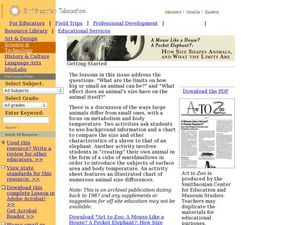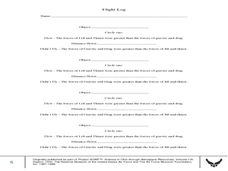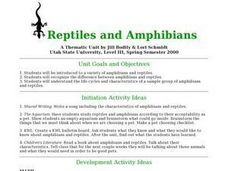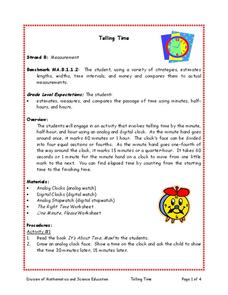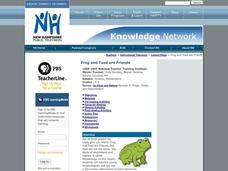Curated OER
Food Chains
Students study food chains by creating their own slide show using KidPix. They compare information after sharing their slide shows as a whole group. As the children are watching the slide shows of their peers, they tally every time...
Curated OER
How Size Shapes Animals
Students investigate how size affects large and small animals differently. In this animal lesson plan, students determine how size affects different animals by constructing their own animal out of marshmallows. Once students create...
Curated OER
A Shadow of Yourself
Young scholars measure the length of their shadows three times during the day, Students determine the differences in shadow lengths after each measurement. They discuss why the length changed from one time of day to another.
Curated OER
The Monarch Butterfly Watch
Young scholars explore monarch migration through the Journey North web site. In this butterfly lesson, students use the internet to identify a butterfly's migration pattern. Young scholars write in electronic journals.
Curated OER
Household Things that Fly and Why!!!
Students examine the four forces of flight. In this flight activity, students test to see which types of items will fly. Students make predictions on whether the item will fly or not. Students gain knowledge about lift, gravity, thrust...
Curated OER
Maple Syrup
Students explore maple syrup. In this natural resources lesson, students identify a maple tree in their neighborhood and observe the sap. Students sample maple products and create a graph of the taste-testing results.
Curated OER
The Magic School Bus Plays Ball
Students learn along with Ms. Frizzle's class. In this Magic School Bus lesson plan, students work in small groups to find how movement changes when there is more - and less - friction.
Curated OER
Hot n' Cold
Students keep a weather log. For this weather and temperature lesson, students discuss the information that can be obtained from a map and lead into a discussion about temperature. Students watch a video about temperature and...
Curated OER
Flight Dreams - Flight Factors
Students investigate the physics of flight by experimenting in class. In this history of flight instructional activity, students define terms such as gravity, lift, and drag in order to better understand how a plane is able to stay...
Curated OER
Weather Observation Journal
Students record weather for a period of one month. In this weather lesson, students observe weather for one month on a large pictograph. Students record clouds, wind, temperature and any other weather conditions they observe. Students...
Curated OER
Beautiful Bugs
Students investigate the life cycle of ants, ladybugs, and butterflies. They list the four stages of the butterfly life cycle, define symmetry and observe how ants make homes in dirt.
Curated OER
Here's the Pitch
Students define pitch, measure varying amounts of water into containers, make predictions about the sounds made when striking the containers, put containers in order from highest to lowest pitch, and create their own sound patterns with...
Curated OER
Ramps
Students experiment to see how various objects roll down ramps. In this ramp lesson, students observe weight, size, and material of objects. Students compare speeds by using a second ramp.
Curated OER
Estimating
Students complete a worksheet. In this estimation lesson, students view various ties and estimate the number of objects or pictures on it. Students complete a worksheet on estimation and then make their own tie pattern.
Institute of Electrical and Electronics Engineers
Design and Build A Better Candy Bag
Young scholars discuss how the final design for a product can affect its success. They work together to design and develop a better candy bad. They predict the volume and strength they need for the bag to be successful.
Curated OER
Zoom Out
Students explore visual perception and how objects change as distance changes. In this distance and vision instructional activity, students practice their scientific inquiry skills. Students practice drawing objects from different points...
Curated OER
How Does Your KinderGarden Grow
Students find forecast and graph weather by using WeatherBug site, create flower books by using Wiggleworks, and plant radish seeds both on KidPix and in class garden.
Curated OER
How Does a Butterfly Grow?
Students explore the stages of a butterfly. They read and discuss the book, The Very Hungry Caterpillar, by Eric Carle. They draw a picture of their favorite part and create a graph. They write a letter to Eric Carle and observe a...
Curated OER
Sorting
Young scholars experience sorting. In this organization lesson, students play a computer sorting game called "Flood Game" on the "Between the Lions" website. Young scholars visit a library and observe and discuss book organization....
Curated OER
The Anaconda
Learners examine basic facts about the anaconda. They discuss the length of an anaconda, estimate the length of 33 feet, compare their estimate to the actual length, and decorate the paper snake with colored scales.
Curated OER
Telling Time
Students estimate, measure, and compare the passage of time using minutes, half hours, and hours. They read the book 'It's About Time, Max!' with the teacher and draw an analog clock face. They show the time and 30 minutes later, 15...
Curated OER
Making It Balance
Students listen to story, "The 100-Pound Problem," compare their weight with character in story, and weigh different classroom items using nonstandard units and standard units. They experiment with different items that can make scale...
Curated OER
Where Do We Live?
Second graders investigate various types of habitats. In this habitat exploration lesson, 2nd graders view a PowerPoint presentation on habitats and explore websites to gather more information. Students choose a habitat to focus on and...
Curated OER
Frog and Toad are Friends
Students view a 30-minute video activity to discover information about the characteristics of frogs and toads. They then transform themselves into frogs and participate in a Jumping Frog Jubilee. They work in groups of three to measure...

